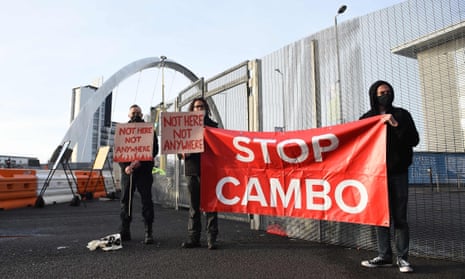Shell’s decision to back out of plans to develop the Cambo oilfield could sound the “death knell” for new large-scale North Sea projects, industry figures say, as the UK’s tougher climate agenda prompts oil companies to retreat from the ageing oil basin.
Sources said Shell’s project partner, the private equity-backed Siccar Point, would struggle to find another partner to take on Shell’s 30% stake in the new oilfield, which has provoked outrage among green campaigners.
Shell’s retreat has cast doubt over the future of a project that could yield hundreds of millions of barrels of oil, and sources say it raises fresh doubts over the North Sea’s future large-scale oil projects too.
“This is a turning point,” said one industry source, who asked not to be named. “Companies will be thinking: if Shell can’t do it, can we? I just don’t see any truly large-scale projects being sanctioned in the North Sea any more. There will still be small developments around existing fields. But this is a death knell for major new projects in the UK.”
The Guardian understands that Shell scrapped the Cambo project after the government made clear it would need to meet certain “climate concessions” to win its approval. The company said publicly that the “economic case for investment” was not strong.
Shell’s withdrawal comes weeks after the company was left disappointed by a UK regulator’s “unexpected” decision to decline its application to develop a separate North Sea project at the Jackdaw field.
“It’s a bit embarrassing for Shell so soon after announcing it would relocate its headquarters to London from the Netherlands,” the source added.
Most big listed oil companies have reduced their presence in the North Sea in recent years by selling off assets, and the companies that remain are relative minnows that would balk at the scale of the Cambo project or lack the experience to develop the field.
“There are no listed oil companies which would look seriously at this project, and the private companies don’t typically have the track record in project development which Shell brought to the table,” said the source.
There was also “a huge amount of uncertainty” around the government’s support for new oil and gas development in the North Sea, according to the source, which could put off smaller companies which require tighter project timelines than larger ones.
Caroline Rance, a campaigner with Friends of the Earth Scotland, said Shell’s exit from the Cambo field “marks the beginning of the end for all new oil and gas projects” in the North Sea.
Green campaigners have called on the government to take a clear stance against new fossil fuel developments after findings from the International Energy Agency, the global energy watchdog, that no new fossil fuel projects are compatible with the world’s climate targets.
“Both the UK and Scottish governments must now officially reject Cambo, say no to any future oil and gas developments in UK waters and get on with planning a fair and fast transition for people working in this industry,” Rance said.
The questions around the North Sea are likely to reignite tensions between the Treasury, which is understood to be concerned over the flight of investment from the UK post-Brexit, and the Department for Business, Energy and Industrial Strategy, which leads the UK’s climate strategy.
Jonathan Roger, the chief executive of Siccar Point, said the company was in consultation with the regulator and stakeholders “on taking Cambo forward and the next steps required to do that”.
He said: “Norway continues to invest in both new oil and gas and renewable developments to deliver a fair and managed transition, but the UK is at risk of damaging its economy and increasing imports with a higher carbon impact if new developments are not brought forward during this time.”










